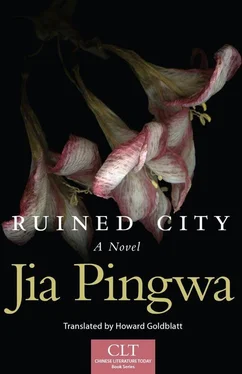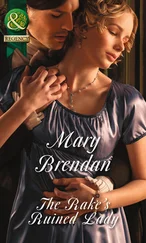“Who is that?” was all he could come up with.
“Let’s just say it’s me,” Ruan said, before shutting the door and leading Zhuang back into his bedroom, where he opened a wardrobe with five shelves, crammed with women’s shoes in all sizes. “I’m fond of women’s shoes. Every pair you see comes with a beautiful story.”
Zhuang wasn’t sure what he meant, but he noticed that Ruan had sleep in his eyes. “Wipe your eyes,” he said. If he bought the shoes for women, why are they still here? Maybe for every pair he gives away he buys another, keeping some sort of record .
Ruan handed Zhuang a pair. “Manager Zhu of the West Avenue Mall gave me these a few days ago. They don’t have a number, and don’t have a story. Give them to your wife. Don’t say no.”
Shoes in hand, Zhuang Zhidie walked out of Ruan’s apartment and rode his scooter all the way to Guangji Road before recalling the payment voucher for one of his essays in his pocket. He turned and headed to the post office near the clock tower to get his money. It wasn’t much, a little over two hundred yuan. Back on what was now a crowd-filled street, he checked his watch and saw that people were just getting off work. Threading his way to the parking lot, shoebox in hand, he asked himself why he’d foolishly accepted the shoes. He had to laugh. Then he had an idea. He went to the nearest telephone booth to call Jing Xueyin at home. A man answered. “Who’s this?” he asked. Knowing it was Jing’s husband, Zhuang hung up and tried her work number. He learned she was away visiting her parents. Patting the shoebox, he listlessly exited the phone booth and stopped to see what the posted newspapers on the kiosk had to report. A young man sidled up to him. “Want to buy some eyeglasses, friend?” he asked under his breath, opening his jacket to reveal a pair with hard frames hanging from his vest. “I won’t lie to you, I stole them. Genuine crystal lenses, priced at eight hundred yuan at the store. I need money. You can have them for three hundred.”
Zhuang looked into the sky, where the sun shone brightly. His eyes narrowed into a smile. He reached into his pocket, but instead of money, he took out one of his cards. “I won’t lie to you, young man. I’ve been in your business, and that makes us soul mates. Here’s my card.”
The youngster took the card, read it, and snapped off a salute. “So you’re Zhuang Laoshi! Today is my lucky day. I went to one of your lectures, but you’re heavier now, with a bit of a paunch, and I didn’t recognize you.”
“You like to write, do you?” Zhuang asked him.
“I’ve dreamed of being a writer since I was a kid. The local paper published one of my little poems last year.”
“Xijing is a remarkable place,” Zhuang commented. “If a meteorite struck down ten people, seven of them would be fans of literature.”
The young man walked off sheepishly, turning around every few steps to look back. Zhuang found it a bit comical and somewhat off-putting. When he came to a sundries store, he bought a set of Jingdezhen porcelain dinnerware, a spatula, a briquette stove, and a tea set with the two hundred yuan, and then told the salesclerk to deliver it all to Tang Wan’er at the address he gave him. After that, he rode his scooter to his in-laws’ house on Shuangren fu Avenue.
Fifty-five years earlier, an eccentric by the name of Niu had lived on the bank of the Wei River in the northern outskirts of town. Coming and going like a shadow, he was adept at observing the constellations to see their effect on the world. At the time, General Yang Hucheng had ended his bandit career in central Shaanxi and become a powerful force in Xijing. He invited the eccentric Niu to be his aide. Unwilling to live in the city, Niu remained in his three-room cottage with its acre of anemic farmland, where he lived a life of ease, going into town when General Yang had something important for him to do. Soon thereafter, the Henan warlord Liu Zhenhua laid siege to Xijing. After meeting stiff opposition for eighty days, Liu tried the Japanese tactic of tunneling into the city. The residents knew what the enemy was up to, but did not know where the tunnel ended, so at night they buried earthenware vats filled with water and regularly checked to see if they were disturbed. They were in a constant state of anxiety. The eccentric arrived, dressed in traditional garb, and after walking through the city, street by street and lane by lane, he rested on a boulder at the martial-arts school to smoke his water pipe.
“Dig here to create a lake,” he said after twelve puffs on his pipe. Yang Hucheng was doubtful, but he had all the city’s water brought over. The tunnel ended at the bottom of the lake, and when it broke through, all the water flowed out of the city. Liu Zhenhua was forced to retreat. A grateful Yang rewarded the eccentric with a house on Shuangren fu Avenue; but he chose to return to the bank of the Wei River, so his son moved into town. The largest of Xijing’s four sweet-water wells was located in that lane, where the son created the Shuangren fu Water District, distributing fresh water throughout the city by the wagonload.
Zhuang Zhidie loved talking about this history. Whenever he entertained guests, he had his wife, Niu Yueqing, show them a photo of her grandfather and a plaque made of bone. He also took them to Shuangren fu Avenue and described how the Niu family had occupied an entire lane. His wife had criticized him in the past: “Why must you show off all the time? Are you mocking the Niu descendants as responsible for the family’s decline? My mother had no sons. If she had, we would not have been reduced to owning a mere few houses.”
“I’m not mocking anyone,” Zhuang Zhidie said solicitously on one occasion. “The family may have declined, but the same may not be true for the son-in-law.”
Niu Yueqing cried out, “Ma, did you hear that? Your son-in-law is saying that his fame is responsible for the Niu family prestige! I ask you, does he have the same renown that my father and grandfather enjoyed in their time?”
The old lady still lived in the house on Shuangren fu Avenue, refusing to move to an upstairs apartment in the Literary Federation compound, which forced Zhuang and his wife to travel back and forth between the two places. Every time he entered the street, images of the family’s history filled his mind. He’d stand by the sealed-up well and stare down at the saw-toothed grooves worn into the stone platform by ropes, trying to imagine how it had looked back then. But his wife was right to criticize him, he thought.
The sun beat down mercilessly as Zhuang rode his scooter into the street, engulfed in stifling heat. Sweat ran into his eyes. A stray dog lay panting in the middle of the road, its tongue lolling. Zhuang swerved to miss it and ran into a wall, managing somehow to stay upright, though he scraped some skin off his left thumb. Zhao Jingwu was inside talking to Niu Yueqing when he heard Zhuang ride in through the gate. He ran out to greet him. “It’s about time you got here.” He took the brick from the scooter rack and carried it inside.
“Don’t bring that filthy thing into the house!” Niu Yueqing complained.
“Look closer,” Zhuang said. “It’s from the Han dynasty.”
“You’ve piled up so many of those in the other house that people can’t get in the door; now you want to do the same here. You say they’re from the Han; well, the flies in the house are from the Tang!”
Zhuang cast Zhao Jingwu a pained look, but said, “That comment is pure art. Your art cells don’t catch fire till you’re angry.” He told Zhao to take the brick outside, tie it onto the back of the Magnolia, then come back inside.
It was an old house with large rooms, the walls and posts constructed of the best red pine. Though the carvings — portraits and nature images — were in bad shape, they attested to the original beauty of the place. The eighty-year-old matriarch, who was in her bedroom behind a dividing wall, summoned Zhuang when she heard his voice. She had lost her husband at the age of fifty, and by sixty-three was getting senile. Two years earlier, she had slept for two weeks straight; people thought she was about to die, but then she came back around. Ever since then, she had been spouting nonsense about death and ghosts and acting crazy. The winter before, she had abruptly demanded that Zhuang Zhidie buy her a red cypress coffin. “You’re in fine health,” Zhuang had said. “You’ll live another twenty years, so why buy a coffin now? Besides, underground burials aren’t permitted in the city.” She was unmoved. “I want a coffin as proof of my existence whenever I look at it.” She refused to eat or drink as a threat. Unable to say no, he asked someone to purchase a coffin on Mount Zhongnan. The old lady took her bed apart and put the bedding into the coffin, where she began to sleep. That caused a rift between her and her daughter, who complained that people might accuse them of mistreating her. But Zhuang told his wife that the old lady was probably suffering from narcissism and that they should let her do as she asked. Strangely, once she started sleeping in the coffin, she took to wearing a paper mask when she went out, so enraging her daughter that she kept her mother inside as much as possible. Zhuang, always ready to tease, said the old lady had special powers, and that if he had them he could write magic realist novels by sheer intuition, without imitating a foreigner.
Читать дальше


![Matthew Vincent - [you] Ruined It for Everyone!](/books/216429/matthew-vincent-you-ruined-it-for-everyone-thumb.webp)









